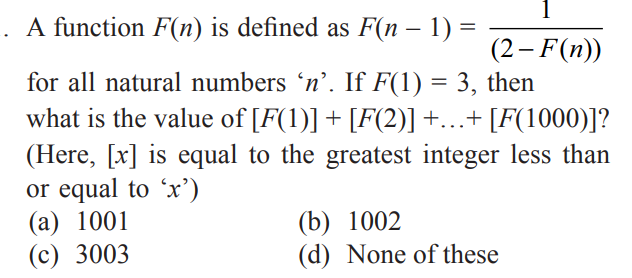Started 3 weeks ago by SHRUTI CHAVAN in
A function F(n) is defined as F(n – 1) = 1 / ( ( 2 - F n)) for all natural numbers ‘n’. If F(1) = 3, then what is the value of [F(1)] + [F(2)] +…+ [F(1000)]? (Here, [x] is equal to the greatest integer less than or equal to ‘x’) (a) 1001 (b) 1002 (c) 3003 (d) None of these
Body

8 Replies
-
Replied 1 year ago
and the solution which im referring is bit confusing and difficult to understand
Replied 1 year ago
and the solution which im referring is bit confusing and difficult to understand
Replied 1 year ago
Kindly share the image of the question , it is not readable properly
Replied 1 year ago
Hi there!We're happy to let you know that your question will be addressed in today's live doubt class, taking place on July 30th at 6:00 PMLive Class Link: https://catking.testpress.in/courses/439/contents/166910/In case you miss the class - You can still access the recording using the same link provided above. This will be the 1st question that Monika Ma'am will be solving in class.Happy Learning!
Replied 3 weeks ago
i didnt understood the question as well i have doubt that do we have to subsititute the value of 1 as 3 directly A function F(n) is defined as F(n – 1) = 1 / ( ( 2 - F n)) for all natural numbers ‘n’. If F(1) = 3, then what is the value of [F(1)] + [F(2)] +…+ [F(1000)]? (Here, [x] is equal to the greatest integer less than or equal to ‘x’) (a) 1001 (b) 1002 (c) 3003 (d) None of these
Replied 3 weeks ago
i didnt understood the question as well i have doubt that do we have to subsititute the value of 1 as 3 directly A function F(n) is defined as F(n – 1) = 1 / ( ( 2 - F n)) for all natural numbers ‘n’. If F(1) = 3, then what is the value of [F(1)] + [F(2)] +…+ [F(1000)]? (Here, [x] is equal to the greatest integer less than or equal to ‘x’) (a) 1001 (b) 1002 (c) 3003 (d) None of these
